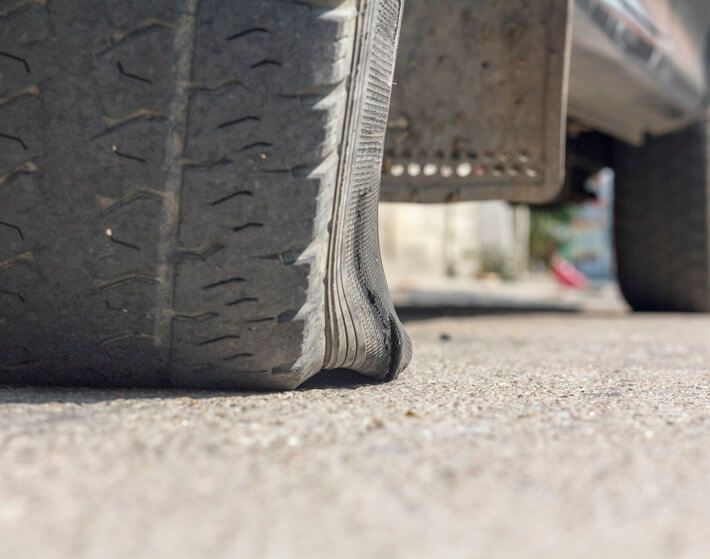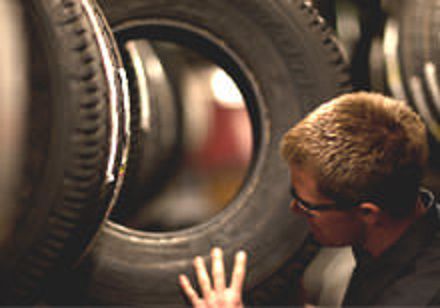First you’ll hear a loud BOOM, then a sudden jerk and pull to one side. At highway speeds a tire blowout can quickly cause an inexperienced driver to panic and lose control. According to the National Highway Traffic Safety Administration, tire blowouts cause over 75,000 accidents and kill over 400 drivers each year. Yikes! Before you let those numbers send shivers down your spine, know that a tire blowout doesn’t necessarily spell disaster, even if you aren’t a professional stunt driver.
By following a few simple tips, almost anyone can safely regain control after a blowout. Here's everything you need to know for surviving a tire blowout (plus how to avoid one in the first place).
Surviving a Blowout
Step 1: Stay calm. The absolute best thing you can do in the first few moments after your tire blows is absolutely nothing. Don’t turn the steering wheel. Don’t step on the brakes. Don’t take your foot off the gas pedal. Any of these actions could cause you to suddenly lose control of the vehicle and spin out. Take a deep breath and don’t panic.
Step 2: Steer straight. When your tire blows, you are going to feel the car pull to one side. Grip the wheel firmly with both hands at 10 and 2. You might feel the car wobble or fishtail, but it is vitally important that you resist the urge to turn the wheel sharply and overcorrect. Do your best to keep the vehicle going straight.
Step 3: Gently press the gas pedal. This may feel counterintuitive, but accelerating slightly after a tire blowout can help you regain control of the vehicle by maintaining your forward momentum. Once you’ve gained control, step off the gas pedal slowly.
Remember: the worst thing you can do when your tire blows is hit the brakes.
Step 4: Allow the car to slow itself. A blown tire is going to act like a parachute, naturally slowing your speed. At this point, either you or a passenger can turn on the emergency lights, as you’ll quickly decelerate to below cruising speeds. Do your best to point the vehicle straight and avoid turning your steering wheel.
Step 5: Once your speed drops below 30 mph, gently step on the brakes. When you’ve slowed down to a safe speed, 20 mph or so, you can turn the steering wheel slowly to guide your vehicle off the road. When you are safely out of traffic, take a deep breath and call for help.
Avoiding a Blowout
Double check tire pressure early and often. When it comes to blown tires, prevention is the best survival strategy. The vast majority of blowouts are caused by improper tire pressure. In the United States, cars sold after 2007 are required to be equipped with an electronic tire pressure monitoring system that alerts you when your air pressure fluctuates above or below safe levels. If you have an older car, you’ll have to do the monitoring yourself.
Check your tire pressure before any long trips (find out your vehicle's recommended tire pressure with this helpful online tire pressure tool). This is especially important in the summer, when the temperature of the pavement can rise to 140 degrees and cause your tire pressure to rise to bursting levels. If your tires feel “off” or you have a tire pressure warning light on, head to your local Firestone Complete Auto Care location to take advantage of a total tire checkup and repair service. Having your tires examined at the first sign of trouble is the best way to avoid a blowout altogether.
Don’t drive on old, worn tires. If the tread on your tires is worn down or if there are any cracks in the rubber, you could be doing some serious damage to your ride and your rims. Driving on worn tires in the heat of summer is asking for trouble, plain and simple. If checking your tires isn't something you think you'll do often, (because hey, we're all busy) you may want to choose a set of tires that does the work for you. Some tires, like DriveGuard tires, are uniquely engineered with a high tech cooling system that evenly distributes heat to help maintain safe tire pressure and prevent a blowout, even in extreme conditions.
The bottom line? High quality tires and a little bit of due diligence can prevent most blowout situations. If you have any inkling that your tires may be "off," visit your local Firestone Complete Auto Care for a total tire checkup. Our tire shops are open late and on weekends, so when you need us--we're ready!



